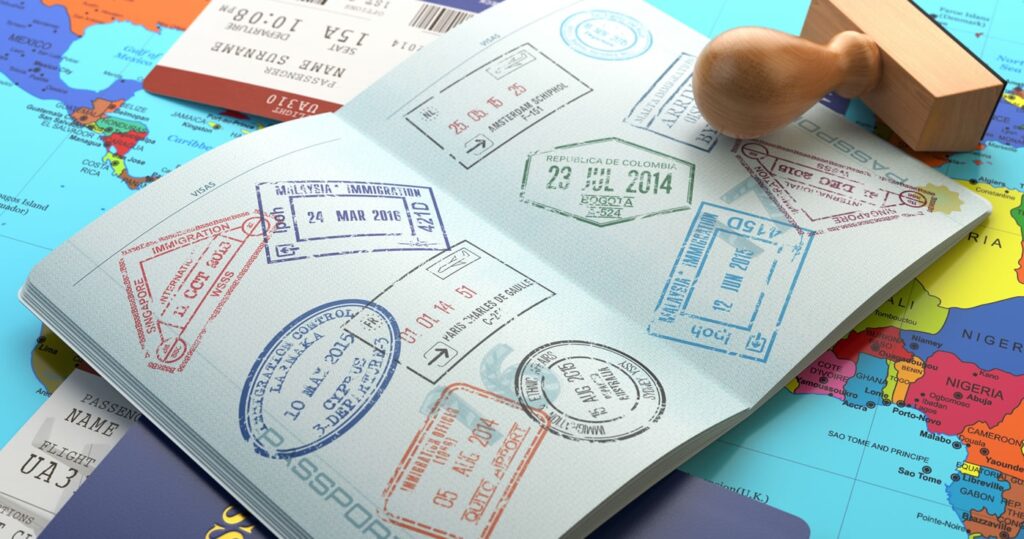
Overwhelmed by the Nigerian visa process? You’re not alone. Many avoid visiting or doing business in Nigeria for this reason. This guide simplifies the process of getting your Nigerian travel visa. It breaks down visa types and the required documents.
It walks you through the Nigerian travel visa application, helping you avoid mistakes and secure approval. Discover additional tips and tricks for a smooth Nigeria visa applications in our article.
What is the Nigerian Travel Visa System?
The Nigeria Immigration Service (NIS) ⬈ is a structured system that uses technology to streamline applications. The hybrid visa application process begins with an online application and the submission of supporting documents. The Nigerian visa process ends with a mandatory in-person visit for verification and biometric enrolment. Check all details and documents before booking an embassy appointment.
Which type of Nigerian Visa Do I Need?
Here are the various types of Nigerian visas ⬈ tailored to different kinds of visits:
1. Short-Term Visas For a Quick Trip
The short-term visa ⬈ is issued for short stays, typically between 30 and 90 days. Tourists and business travellers coming to Nigeria for purposes such as conferences or meetings usually choose the business visa. An invitation letter from the host company in Nigeria is required for business travellers, allowing a stay of up to 30 days.
2. Temporary Work Permit (TWP) Visa
This visa is distinct from general employment visas; it is for professionals travelling to Nigeria specifically to work on short-term projects requiring pre-approval from the Comptroller General of Immigration for specialized assignments.
3. Temporary and Permanent Residence Visas: The Long-Term Stay
Temporary and permanent residence visas are available for foreigners planning to live in Nigeria for work or specific projects, either on a temporary or permanent basis. These visas require an approved expatriate quota from the Nigerian Immigration Service. After an initial 90-day entry, the visa may be converted to a two-year renewable residence permit.
4. The Student Visa
The student visa is available to individuals enrolled in full-time study programmes. It is valid for one year and renewable. Employment is not permitted while on a student visa unless explicitly authorized.
5. The Visa on Arrival (VOA)
The visa on arrival (VOA) requires advance approval before travel. Applicants must obtain an approval letter through an online application before departure, which is necessary to board airlines flying to Nigeria. Required documents include a passport, a recent photograph, and an invitation letter from a host. Upon arrival at the airport, travelers present their approval letter to receive the visa.
Read this article for information on how to apply for other visas, like the Canadian working holiday visa ⬈.
Essential Documents Required for Nigerian Visa Application
To avoid visa issuance delays and outright rejection, you need this set of documents ⬈:
- Your Passport and Passport Photograph: Your passport must be valid for at least six months from the date of your application and have a few blank pages. You also need two recent colour passport photographs that meet specific technical specifications. For example, a 200×450 pixel photo on a white background with a neutral expression.
- Proof of Funds and Accommodation: You must demonstrate you have the funds to cover your trip. A recent bank statement is the most common way to prove you can fund your trip. You need to provide evidence of your accommodation during your visit. It could be a confirmed hotel reservation or a letter of invitation from a host in Nigeria.
- Other Paperwork: You need printed copies of the completed online application form, payment receipt, and acknowledgement slips. For a business visa, you need an invitation letter from the Nigerian company and a copy of its Certificate of Incorporation. You also need proof of funds and a return flight ticket to demonstrate that you intend to return home.
For additional details about the required documents for a Nigerian visa, please consult this guide.
The Nigerian Visa Application Process
Follow each step below carefully to avoid rejection:
1. Online Application

This is your first step for a Nigerian travel visa.
- Log in to the official Nigeria Immigration Service (NIS) website ⬈.
- Create an account and complete the visa application form with your personal details, passport information, and travel details.
- After submission, an application ID and reference number will be generated.
- Save these for future purposes, such as an in-person meeting, and continue the application process.
2. Payment and biometric appointment
Continue the Nigerian e-visa application process as outlined.
- Completing the e-visa application form.
- Make payments with your debit or credit card.
- Please remember to print and save the payment receipt for your in-person appointment.
3. The in-person submission stage
It requires you to appear for biometric enrollment, which includes fingerprinting and a photograph. Applicants applying from abroad should attend their appointment at a Nigerian mission or a designated application centre operated by an approved organization.
How Much Is the Nigerian Visa Fee?
The total cost of processing your Nigerian travel visa can vary depending on the type of visa you apply for.
For example, Destinali ⬈ reports that a single-entry visa may cost $160, while a multiple-entry visa costs around $200. Visa application fees also depend on the applicant’s nationality. Some nationals, such as those from Eritrea, may pay as little as $2, while U.S. citizens may pay up to $160.
If you use the third-party application center, you will pay a mandatory service fee. Nigerian visa fees are subject to change periodically; please confirm visa processing costs on the Nigerian Immigration official website.
Common Application Mistakes to Avoid
Here are some things that can disqualify you ⬈:
- Inaccurate or incomplete application details, such as missing documents, blank fields, or typographical errors, are common reasons for visa refusal. Carefully review your application and use a checklist to ensure that all information is correct before submitting it.
- Failure to demonstrate strong ties to your home country may result in a visa refusal. Visa officers typically require evidence such as steady employment, property ownership, family commitments, or a return flight ticket to confirm the applicant’s intention to return after the visit.
Conclusion
Applying for a Nigerian travel visa can be straightforward when you understand the different visa types. It is important to gather all documents required for Nigerian visas and follow the application steps carefully. By avoiding common mistakes, you can improve your chances of approval.
For finance, visas, and travel guides, subscribe to the SimplVest Newsletter.












